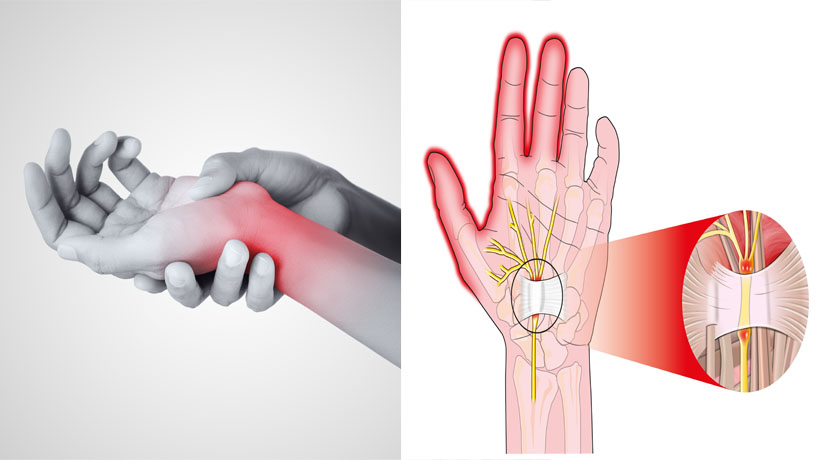It may be of relief to know that long-term typing or computer use points to a weak link in developing carpal tunnel syndrome (CTS). On the contrary, it may be of surprise to know that other factors, including certain health problems, increase the likelihood of CTS in women by three times as much as men.
CTS is a condition that causes numbness, tingling, swelling or loss of strength in the wrist and hand. It is caused by a compressed nerve in the carpal tunnel – a narrow passageway on the palm side of your wrist. This median nerve provides sensation to the palm side of your thumb and fingers, except the pinky, and nerve signals for the muscles around the base of your thumb.
Though there is no one specific cause that directly triggers CTS, here are some risk factors that may increase your chances of developing it.
Genetic predisposition
According to David Ring, a hand surgeon at Massachusetts General Hospital in Boston, “the major risk factor for carpal tunnel is genetic.” Those with smaller carpal tunnels may be more likely to develop CTS, which could explain why CTS is generally more common in women than men (we have a relatively smaller carpal tunnel area).
Repetitive movements
People who regularly do the same movements with their hands and wrists daily (e.g. assembly line workers, grocery store checkers, violinists and carpenters) may be more susceptible to CTS. Hobbies and sports that also require similar repetitive motion can be culprits as well (e.g. golfing, gardening and knitting).
Injury or trauma
A wrist sprain or fracture can put pressure on the nerve, further increasing the risk of CTS. Forceful and stressful movements of the hand and wrist can also cause trauma.
Fluid imbalances in the body
Fluid retention within the body can pose a greater risk of CTS due to increased pressure on the carpal tunnel. Pregnant women and menopausal women may experience CTS symptoms due to hormonal changes and/or build-up of bodily fluids. Almost always, however, CTS associated with pregnancy subsides after childbirth.
Breast cancer
In breast cancer patients who undergo a mastectomy (surgical removal of the breast), some may experience lymphedema (swelling caused by the removal of lymph nodes). Although rare, some women may get CTS due to the pressure on the nerve from this swelling.
Medical conditions
People who have diabetes, hypothyroidism, lupus, obesity, and rheumatoid arthritis may have an increased chance of CTS due to enlarged wrist structures. If you suffer from any of these health conditions or are experiencing any numbness, pain or tingling in the hand or wrist, consult a health professional for treatment.
Sources:
https://www.womenshealth.gov/a-z-topics/carpal-tunnel-syndrome
https://www.mayoclinic.org/diseases-conditions/carpal-tunnel-syndrome/symptoms-causes/syc-20355603
https://www.mayoclinic.org/diseases-conditions/lymphedema/symptoms-causes/syc-20374682
https://www.webmd.com/pain-management/carpal-tunnel/news/20070216/carpal-tunnel-blame-genes-not-overuse#1



